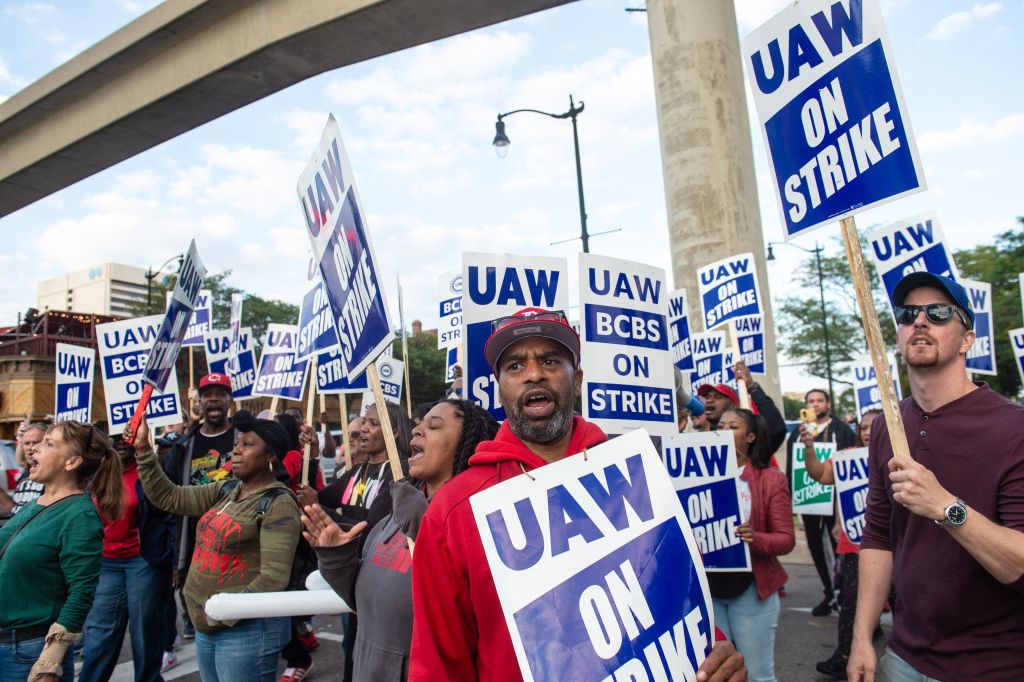Happy Tuesday! Investors in lab-grown meat companies are probably breathing a big sigh of relief after a trio of Islamic scholars and a Jewish kosher certification authority cleared cultivated meats as Halal and Kosher, respectively. Not everyday you can add about 2 billion people to your potential customer base essentially overnight.
Quick Hits: Today’s Top Stories
- Five American citizens held prisoner in Iran—several of whom were behind bars for more than five years—were freed yesterday and, as of last night, making their way back to the United States by way of Qatar. The prisoner release was part of a deal Iran brokered with the Biden administration in exchange for the release of five Iranians detained for sanctions violations and the unfreezing of $6 billion in Iranian oil money.
- The wreckage of an F-35 jet lost on Sunday evening after the pilot flying the aircraft made an emergency bailout was located last night in Williamsburg County, 100 miles north of Charleston, South Carolina, according to military officials. It’s unclear what led to the incident, but the Marine Corps is suspending all aviation unit flights for two days— to “discuss aviation safety matters and best practices”—in response to the crash and other mishaps in recent weeks.
- Former President Donald Trump will reportedly skip next Wednesday’s Republican primary debate at the Ronald Reagan Presidential Library in California, opting instead to give a primetime speech to a group of blue-collar, union workers in Detroit.
- Rep. Jennifer Wexton—a Democrat from Virginia—announced yesterday that she will not seek reelection for a fourth term after receiving a diagnosis of a rare neurological disorder called progressive supranuclear palsy. Wexton revealed in April that she had cerebral palsy but intended to serve “for many years to come.” In intervening months, the 55-year-old didn’t respond well to treatment, leading to the updated diagnosis. Wexton’s seat is in a competitive district that prior to her first election in 2018 was in Republican hands for 40 years.
- Gil Cisneros—a former one-term Democratic congressman from California—said yesterday he is running in California’s 31st congressional district to replace Democratic Rep. Grace Napolitano, who is retiring at the end of her current term. Cisneros was first elected in 2018, but lost his reelection fight in 2020 to a Republican challenger and later became a Biden administration Defense Department appointee charged with implementing the Pentagon’s diversity, equity, and inclusion efforts.
Biden’s Coalition Under Pressure

As the clock struck midnight last Thursday night, United Auto Workers (UAW) began their targeted “stand up” strikes against the “Big Three” American automobile manufacturers—Stellantis (formerly Chrysler), Ford, and General Motors—marking the first time the union has gone on strike at all three companies at once.
Over the weekend, a number of Democratic elected officials—mostly from the Midwest and U.S. manufacturing strongholds—made pilgrimages to picket lines to prove their labor bona fides. Sens. Gary Peters of Michigan, John Fetterman of Pennsylvania, and Sherrod Brown of Ohio—among plenty of other pols—gripped and grinned in front of the UAW locals and striking plants, posing in union-made cars and shouting, “No justice, no Jeeps!” along with union members. “In the opening hours of the #StandUpStrike, @SenSherrodBrown stands with @UAW in Toledo,” the Ohio branch of the AFL-CIO, the largest federation of unions in the country, posted on X on Saturday, along with a picture of Brown surrounded by picketers. “Because of course he does.”
That certainty from the AFL-CIO—and the mobilization by Democratic politicians—belies a much more complicated picture of a serious strike that is testing the strength of President Joe Biden’s coalition. At the heart of the negotiations with the automakers are UAW’s concerns about the future of auto manufacturing as car companies face pressure from the Biden administration to transition to electric vehicles (EVs), which labor activists fear may come at the cost of union jobs. Though the strikes may result in a slower rollout of EVs—or in EVs and batteries being produced in non-union factories in right-to-work states—environmental organizations who have criticized Biden for not being aggressive enough in combating climate change are nonetheless expressing solidarity with the strikers.
Worth Your Time
- Are expiration dates on food more trouble than they’re worth? “Food experts broadly agree that the expiration dates on every box of crackers, can of beans and bag of apples waste money, squander perfectly good food, needlessly clog landfills, spew methane and contribute to climate change,” Josh Zumbrun writes for the Wall Street Journal. “Although we call them expiration dates, most don’t actually claim anything is expiring or unsafe. Instead, the labels say ‘fresh until,’ ‘display until,’ ‘best when used by,’ ‘better if used by,’ ‘sell by,’ ‘best by,’ ‘enjoy by,’ ‘best before’ or—perhaps worst—provide a date with no explanation at all. The dates originated as a coded system for manufacturers to communicate to retailers when to rotate stock. Consumers clamored for information on the freshness of food, and in the 1970s and 1980s consumer-facing dates became widespread, though never standardized. Food manufacturers have tried, largely in vain, to explain that these are mostly general indicators of when food is at its peak quality. Most foods, properly stored, remain edible and safe long after their peak.”
Presented Without Comment
ABC News: Trump Wrote To-Do Lists for Assistant on White House Documents Marked Classified
Also Presented Without Comment
Washington Examiner: [GOP Sen.] Susan Collins Jokes She Will ‘Wear a Bikini’ in Response to Senate Dress Code Change
Toeing the Company Line
- Reminder! Midwestern readers can join Steve, Declan, Andrew, and fellow members of The Dispatch community at Twisted Vine Brewery in Des Moines, Iowa, for an informal meet and greet this Thursday at 6 p.m. CT. For more information about the event, click here.
- In the newsletters: Kevin makes the case (🔒) against Josh Hawley’s plan to save low-wage jobs from AI, the Dispatch Politics crew outlines Biden’s 2024 messaging strategy, and Nick argues (🔒) the pro-life movement is reaping the consequences of a Faustian bargain with Trump.
- On the podcasts: Drucker sits down with GOP Sen. Tom Cotton to discuss Ukraine aid and American foreign policy on The Dispatch Podcast, while the other two Davids explore a slew of Second Amendment cases on the latest Advisory Opinions.
- On the site today: Drucker reports on Gov. Glenn Youngkin’s push to elect Virginia Republicans this November, Charlotte unpacks the view of Israel’s judicial reforms from Tel Aviv, and Chris argues that we pay too much attention to presidential primary polling.
Let Us Know
What do you think of the demands made by the UAW on behalf of its workers? Reasonable? Excessive? And what would you do with eight extra hours if you could work a 32-hour work week?






Please note that we at The Dispatch hold ourselves, our work, and our commenters to a higher standard than other places on the internet. We welcome comments that foster genuine debate or discussion—including comments critical of us or our work—but responses that include ad hominem attacks on fellow Dispatch members or are intended to stoke fear and anger may be moderated.
With your membership, you only have the ability to comment on The Morning Dispatch articles. Consider upgrading to join the conversation everywhere.